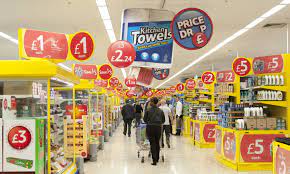UK government says it is meeting with food bosses over high prices

London: UK government said it is engaging with the food sector amid attempts to reduce the inflation-driven strain on British households — but dismissed the possibility of mandating price caps on supermarket goods.
“The government is not considering imposing price caps. Any scheme to help bring down food prices for consumers would be voluntary,” a government spokesperson told CNBC by email.
“We know the pressure households are under with rising costs and while inflation is coming down, food prices remain stubbornly high. That’s why the prime minister and the chancellor have been meeting with the food sector to see what more can be done.”
Citing sources, the Sunday Telegraph had on Saturday said that aides in Prime Minister Rishi Sunak’s office have begun work on a scheme that would see supermarkets voluntarily charge the lowest possible amount for certain items.
Asked in an interview with the BBC on the possibility of a supermarket price cap on basic foods, British Health Secretary Steve Barclay said that the government wanted “constructive discussions with supermarkets about how we work together, not about any element of compulsion.”
Such a proposal would mirror efforts already undertaken in France. A group of major French supermarkets in March agreed to cut prices on a range of basic items and to target a 10% ceiling on average price increases due to input costs. Retailers can choose on which items they cut prices.
French Finance Minister Bruno Le Maire later said he would use “all the powers at my disposal to ensure that the big industrial companies pass on the decrease [in wholesale prices]”.
Food prices have stayed stalwartly strong in Britain. Headline consumer price inflation in the U.K. eased to 8.7% in April from the 10.1% of March, largely due to declines in energy prices. But the inflation rate for food and non-alcoholic beverages proved more resilient, coming in at 19.1% in April, nearly flat on the 19.2% of March. The Office for National Statistics said that was the highest rate for more than 45 years.
The U.K. economic outlook has brightened somewhat, with the Bank of England and International Monetary Fund saying they no longer forecast a recession this year.
However, Britons are also grappling with the impact of firm interest rates, with pressure remaining high on the central bank to continue hiking. Many analysts and economists last week upped their expectations for the BoE’s peak rate to 5.25% or even 5.5%, from the current rate of 4.5%.
BoE Governor Andrew Bailey earlier this month said that the U.K. was struggling with “second-round” inflation — whereby initial price shocks cause businesses to raise prices and workers achieve wage rises, potentially creating a spiral that can make inflation sticky.
Corporate profits have come under scrutiny, as people struggle with the cost of living. Supermarket profits slipped in the first quarter, with several big firms saying they have offset the majority of input cost increases.
In January, the chairman of Tesco, one of Britain’s largest supermarket chains, said it was “entirely possible” that some food firms were profiteering from inflation in order to protect their own margins, and that the business had “fallen out” with some of its suppliers over the issue.
Andrew Opie, director of food and sustainability at industry group the British Retail Consortium, said any supermarket price cap would “not make a jot of difference to prices,” which he attributed to “the soaring cost of energy, transport, and labour, as well as higher prices paid to food manufacturers and farmers.”
“Rather than recreating 1970s-style price controls, the government should focus on cutting red tape so that resources can be directed to keeping prices as low as possible,” Opie said.





